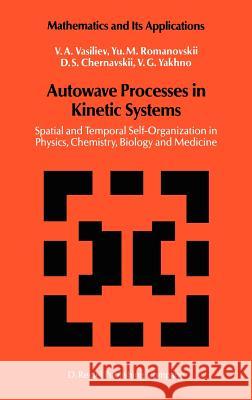Autowave Processes in Kinetic Systems: Spatial and Temporal Self-Organisation in Physics, Chemistry, Biology, and Medicine » książka
Autowave Processes in Kinetic Systems: Spatial and Temporal Self-Organisation in Physics, Chemistry, Biology, and Medicine
ISBN-13: 9789027723796 / Angielski / Twarda / 1987 / 262 str.
Autowave Processes in Kinetic Systems: Spatial and Temporal Self-Organisation in Physics, Chemistry, Biology, and Medicine
ISBN-13: 9789027723796 / Angielski / Twarda / 1987 / 262 str.
(netto: 191,66 VAT: 5%)
Najniższa cena z 30 dni: 192,74
ok. 16-18 dni roboczych.
Darmowa dostawa!
Probably, we are obliged to Science, more than to any other field of the human activity, for the origin of our sense that collective efforts are necessary indeed. F. Joliot-Curie The study of autowave processes is a young science. Its basic concepts and methods are still in the process of formation, and the field of its applications to various domains of natural sciences is expanding continuously. Spectacular examples of various autowave processes are observed experimentally in numerous laboratories of quite different orientations, dealing with investigations in physics, chemistry and biology. It is O1). r opinion, however, that if a history of the discovery of autowaves will he written some day its author should surely mention three fundamental phenomena which were the sources of the domain in view. "Ve mean combustion and phase transition waves, waves in chemical reactors where oxidation-reduction processes take place, and propagation of excitations in nerve fibres. The main tools of the theory of autowave processes are various methods used for investigating nonlinear discrete or distributed oscillating systems, the mathe matical theory of nonlinear parabolic differential equations, and methods of the theory of finite automata. It is noteworthy that the theory of autowave, ., has been greatly contributed to be work of brilliant mathematicians who anticipated the experimental discoveries in their abstract studies. One should mention R. Fishel' (1937), A. N. Kolmogorov, G. 1. Petrovskii, and N. S. Piskunov (1937), N. Wiener and A. Rosenbluth (1946), A. Turing (1952).











